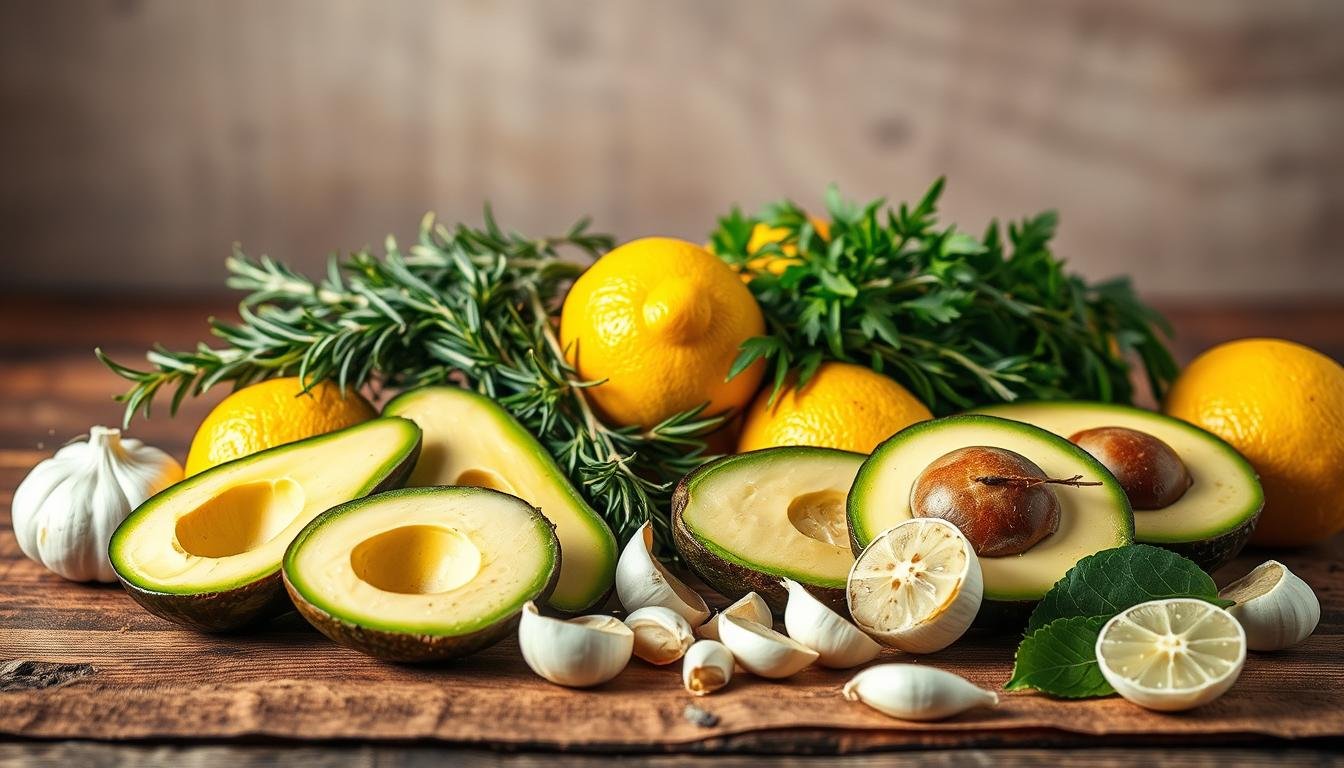In today’s fast world, stress and anxiety are common. Many look for natural ways to manage these feelings. Herbal teas are a popular choice, known for their calming effects.
Natural remedies for anxiety like herbal teas offer a holistic approach. From chamomile to ashwagandha, these teas can ease stress and anxiety. This article will guide you through the best herbal teas for stress, helping you find the perfect cup for calmness.
Key Takeaways
- Herbal teas offer a natural way to relieve stress and anxiety.
- Certain herbal teas, like chamomile and ashwagandha, are known for their calming properties.
- Brewing the right herbal tea can be a soothing ritual.
- Herbal teas provide a holistic approach to mental wellness.
- Exploring different herbal teas can help you find what works best for you.
Introduction to Herbal Teas and Anxiety
Many people look for calm in a busy world. They find it in herbal teas, known for easing anxiety. These teas are a favorite because they calm and have few side effects.
Herbal teas are made from plants like leaves, flowers, roots, or fruits. They don’t come from the Camellia sinensis plant, which is used for regular tea. For centuries, people have used them for health and relaxation.
What are Herbal Teas?
Herbal teas, or tisanes, come from parts of plants, not tea leaves. They can be leaves, flowers, roots, or fruits. This variety means there’s a tea for every taste and need.
| Type of Herbal Tea | Plant Part Used | Common Benefits |
|---|---|---|
| Leaf Teas | Leaves | Relaxation, Stress Relief |
| Flower Teas | Flowers | Calming, Anxiety Reduction |
| Root Teas | Roots | Digestive Health, Energy Boost |
How Herbal Teas Help with Anxiety
Herbal teas can help with anxiety. They calm the mind, reduce stress, and improve mood. Teas like chamomile and lavender are especially good at easing anxiety.
Knowing how herbal teas work can help people choose them for anxiety. Whether it’s chamomile’s soothing or lavender’s calming scent, these teas are a gentle way to manage stress.
Chamomile Tea: The Classic Soother
Chamomile tea is a timeless herbal solution for anxiety and stress. It has been a key part of natural remedies for centuries. It’s known for its soothing effects on the mind and body.
Benefits of Chamomile
Chamomile tea offers many benefits, thanks to its active compound, apigenin. This compound interacts with the brain, potentially reducing anxiety and promoting relaxation. It’s a great natural choice for calming down.
Key Benefits:
- Promotes relaxation and reduces anxiety
- Improves sleep quality
- Soothes digestive issues
How to Brew Chamomile Tea
Making chamomile tea is easy. You need dried chamomile flowers and hot water. Steep the flowers in hot water for 5-10 minutes. The longer it steeps, the stronger the tea.
Tips for the perfect brew:
- Use one teaspoon of dried chamomile flowers per cup
- Steep for 5-10 minutes based on desired strength
- Strain and enjoy hot or iced
| Benefit | Description |
|---|---|
| Relaxation | Chamomile tea promotes relaxation, helping to calm the mind and body. |
| Sleep Improvement | Drinking chamomile tea before bed can improve sleep quality. |
| Digestive Soothing | Chamomile tea can soothe digestive issues, providing relief from discomfort. |
Lavender Tea: Aromatic Calm
Lavender tea is a natural way to relax. It’s known for its calming effects, perfect for those with stress and anxiety.
Lavender tea works by affecting the brain’s limbic system. It contains linalool, which helps reduce anxiety and brings calm.
The Science Behind Lavender
Lavender’s calming effects come from its chemicals. Lavender’s essential oils, like linalool and linalyl acetate, are key. They improve mood and brain function, helping with anxiety.
Brewing Tips for Lavender Tea
To enjoy lavender tea, brew it right. Here’s how:
- Choose high-quality, dried lavender buds.
- Steep the buds in hot water (around 200°F) for 5-7 minutes.
- Strain the tea and savor its floral taste and aroma.
Adding lavender tea to your day can help you relax and lower anxiety. Always talk to a healthcare expert before using it regularly.
Peppermint Tea: Refreshing Relief
Peppermint tea is known for its invigorating flavor. It offers a unique way to manage anxiety and stress. Its benefits go beyond just tasting good.
The menthol in peppermint tea can ease digestive issues caused by stress and anxiety. Its aroma and flavor can also calm and refresh you. This might help reduce muscle tension.
Benefits of Peppermint for Stress
Peppermint tea has many benefits for stress relief:
- Relieves Digestive Issues: Peppermint can soothe digestive problems that stress can make worse.
- Reduces Muscle Tension: The menthol in peppermint relaxes muscles, easing tension from anxiety.
- Improves Mental Clarity: Peppermint tea’s invigorating flavor boosts focus and mental clarity. This makes it easier to handle stressful situations.
How to Prepare Peppermint Tea
Preparing peppermint tea is easy:
- Use fresh or dried peppermint leaves.
- Steep the leaves in hot water for 5-7 minutes.
- Strain and enjoy it hot, or cool it down for a refreshing iced tea.
To enhance your experience, try adding a slice of lemon or a drizzle of honey to your peppermint tea. Experimenting with different ways can help you find the best way to enjoy its stress-relieving benefits.
Lemon Balm Tea: A Gentle Helper
Lemon balm tea is known for its calming effects. It helps reduce anxiety and stress gently. This herbal tea is a trusted remedy for many.
The History of Lemon Balm
Lemon balm comes from the mint family and has been used for centuries. It contains rosmarinic acid, which helps lower anxiety. The ancient Greeks and Romans used it for stress relief and better sleep.
Today, lemon balm is grown worldwide for its soothing effects. Its citrusy taste makes it a favorite for relaxation.
Brewing Instructions for Lemon Balm
To make lemon balm tea, start by steeping dried lemon balm leaves in hot water. Let it sit for 5-10 minutes. Use one teaspoon of leaves per cup of water for a good flavor.
You can mix lemon balm with chamomile or lavender for a stronger tea. Here’s a simple recipe:
- 1 teaspoon of dried lemon balm leaves
- 1 cup of boiling water
- Honey or lemon to taste (optional)
Strain the tea and enjoy it. You can add honey or lemon for extra taste.
Drink lemon balm tea any time, but it’s best at night for better sleep.
| Benefit | Description |
|---|---|
| Calming Effects | Lemon balm tea is known for its ability to reduce anxiety and promote relaxation. |
| Historical Significance | Used for centuries in traditional medicine for its medicinal properties. |
| Versatility | Can be enjoyed on its own or blended with other herbal teas for enhanced benefits. |
Passionflower Tea: A Natural Sedative
Passionflower tea is known for its calming effects and ability to reduce anxiety. It has been used for centuries to soothe the mind and body.
Passionflower tea contains flavonoids and alkaloids. These compounds help relax and lower anxiety levels. It works by affecting certain brain chemicals, leading to a calming effect.
How Passionflower Works
The compounds in passionflower tea boost GABA levels in the brain. GABA helps us feel calm and less anxious. This makes passionflower tea great for easing anxiety and stress.
Some key benefits of passionflower tea include:
- Promoting relaxation and reducing anxiety
- Improving sleep quality
- Enhancing overall mental wellness
Tips for Enjoying Passionflower Tea
To make passionflower tea, steep dried passionflower in hot water for 5-10 minutes. Its subtle, sweet flavor is perfect for unwinding before bed. You can mix it with other teas for a unique taste.
For the best experience, follow these tips:
- Choose high-quality, organic passionflower for the best results.
- Try different steeping times to find your favorite strength.
- Blend passionflower tea with calming teas like chamomile or lavender for a stronger effect.
Adding passionflower tea to your daily routine can help improve your mental health and reduce anxiety.
Ashwagandha Tea: Adaptogenic Benefits
Ashwagandha tea is special because it helps with stress relief. It comes from the ashwagandha plant’s roots. For centuries, it’s been used in Ayurvedic medicine to boost well-being and fight stress.
What is Ashwagandha?
Ashwagandha, or Withania somnifera, is a stress-fighting herb. It helps the body handle stress and stay balanced. The withanolides in ashwagandha might lower cortisol levels, easing stress and anxiety.
Brewing and Usage Guidelines
To make ashwagandha tea, soak dried ashwagandha root in hot water for 5-10 minutes. Its earthy taste might take some getting used to. But, its benefits are worth it. Start with a small amount and increase as you get used to it.
Tips for Enjoying Ashwagandha Tea:
- Try adding honey or lemon to mask the taste.
- Blend it with other herbs like ginseng or rhodiola for better flavor.
- Drink it whenever it fits into your day, whether morning or before bed.
Ashwagandha tea is a great choice for managing stress. It’s known as one of the best herbal teas for stress because of its adaptogenic effects. Adding it to your daily routine can help you feel better and more relaxed.
Valerian Root Tea: Sleep Aid Overnight
Valerian root tea has been a sleep aid for centuries. It comes from the valerian plant, known as Valeriana officinalis. The valerenic acid in it helps with sleep.
Valerian’s Role in Relaxation
The root of valerian contains compounds that reduce stress and anxiety. This makes it easier to fall asleep. It also improves sleep quality by making it deeper and more restful.
Unlike some sleep aids, valerian root tea doesn’t cause dependency. It’s a safe choice for long-term use.
Valerian root tea calms the mind and body before sleep. Drinking it before bed can signal to your body that it’s time to rest. This can improve your sleep quality.
Preparation of Valerian Root Tea
Making valerian root tea is easy. Just steep 1-2 teaspoons of dried root in hot water for 5-10 minutes. You can add honey for taste. Drink it 30 minutes before bed to help you sleep.
Here’s a simple guide to brewing valerian root tea:
| Ingredient | Quantity | Steeping Time |
|---|---|---|
| Dried Valerian Root | 1-2 teaspoons | 5-10 minutes |
| Water | 1 cup | – |
Benefits of Valerian Root Tea:
- Promotes relaxation and reduces stress
- Improves sleep quality
- Non-habit forming
- Easy to prepare
Green Tea: The Calm Energy Option
Green tea is a special choice for those wanting to reduce stress but keep their energy up. It has L-theanine, an amino acid that helps you relax and lowers stress.
Green tea’s calming effect, along with its natural energy boost, makes it great for fighting natural remedies for anxiety. L-theanine in green tea helps you feel calm without making you sleepy. This makes it perfect for drinking every day.
Antioxidants in Green Tea
Green tea is packed with antioxidants. Antioxidants fight off free radicals, which can harm your health. The antioxidants in green tea, like catechins, boost your well-being and help you relax.
Drinking green tea regularly can help with mental wellness. Adding green tea to your daily routine can give you its antioxidant and L-theanine benefits. This supports both your body and mind.

Brewing Suggestions for Green Tea
To enjoy green tea’s full benefits, brew it right. Unlike black tea, green tea needs gentle brewing. Steep the leaves in hot water (not boiling) for 1-3 minutes. Aim for a temperature of 160°F to 170°F.
Try different brewing times to find your favorite taste and strength. Some like it light, while others prefer it stronger. Green tea’s mild, grassy taste makes it great for trying out different herbal teas for mental wellness.
Adding green tea to your daily routine can bring calm and energy. It’s a great choice for your collection of best herbal teas for stress.
Holy Basil Tea: Stress and Balance
Looking for a natural way to ease stress? Holy Basil Tea is a great pick. Known as Tulsi, it’s been a key part of Ayurvedic medicine for ages. It helps your body handle stress better and keeps it balanced.
The Adaptogenic Qualities of Holy Basil
Holy Basil has special compounds like eugenol. These might help lower stress and anxiety by balancing how your body reacts to stress. Its adaptogenic properties make it a solid natural remedy for stress and anxiety.
The adaptogenic qualities of Holy Basil Tea come from its effect on your body’s stress system. It helps control cortisol levels and makes you more resilient to stress.
How to Make Holy Basil Tea
To brew Holy Basil Tea, steep dried Holy Basil leaves in hot water for 5-7 minutes. Its spicy, peppery taste is quite refreshing. It’s perfect for those looking for a natural way to relax.
You can tweak the amount of Holy Basil leaves to your liking. Adding lemon or honey can also make it taste better.
| Herbal Tea | Adaptogenic Properties | Stress Relief Benefits |
|---|---|---|
| Holy Basil Tea | Contains eugenol, which helps reduce stress and anxiety | Promotes balance in the body’s response to stressors |
| Ashwagandha Tea | Helps regulate cortisol levels and improves resilience to stress | Reduces anxiety and stress |
| Lavender Tea | Promotes relaxation and calms the mind | Soothes anxiety and promotes better sleep |
Rooibos Tea: Caffeine-Free Comfort
Rooibos tea is a top pick for its lack of caffeine and health perks. It’s made from the leaves of the Rooibos plant, found in South Africa. It tastes nutty and slightly sweet.
This tea is packed with antioxidants, which help lower stress and encourage relaxation. Since it has no caffeine, it’s perfect for those who can’t handle stimulants or need a calm tea before bed.
Health Benefits of Rooibos
Rooibos tea offers many health benefits. It:
- Reduces stress and anxiety with its calming effects.
- Improves heart health by enhancing circulation and lowering blood pressure.
- Strengthens the immune system with its antioxidants.
These advantages make Rooibos tea a great choice for daily wellness, especially for those looking for calming herbal teas to ease anxiety.
Steps to Brew Rooibos for Anxiety
Making Rooibos tea is easy. Just follow these steps:
- Start with one teaspoon of dried Rooibos leaves for each cup of tea.
- Steep the leaves in boiling water for 5-10 minutes, depending on your taste.
- Strain the tea and enjoy it hot or iced, with or without sugar.
Adding Rooibos tea to your daily routine can bring calm and relaxation. It’s a great pick among herbal teas for soothing anxiety and boosting well-being.
Choosing the Right Tea for You
Finding the perfect herbal tea is about knowing what you want. There are many teas out there, each with its own benefits. Think about what you’re looking for, like relaxation, energy, or health benefits.
Factors to Consider
When picking an herbal tea, think about a few things. Personal taste preferences matter a lot. You’ll enjoy drinking a tea that tastes good to you. Also, think about the specific health benefits you want, like less anxiety or better sleep.
- Relaxation and Calm: Teas like chamomile and lavender help you relax.
- Energy Boost: Peppermint and green tea give you a natural energy boost.
- Anxiety Relief: Herbal teas like passionflower and ashwagandha help with anxiety.
Creating Your Own Tea Blend
Making your own tea blend is fun and rewarding. It lets you customize the flavor and benefits for yourself. Start with a base tea, like rooibos or green tea. Then, add herbs and botanicals that match your goals.
For example, mix lemon balm and chamomile for a calming tea. Or, try peppermint and ginger for a refreshing and invigorating blend.

Conclusion: Embracing Herbal Teas for Anxiety Relief
Adding herbal teas to your daily routine can help manage stress and anxiety. You can try chamomile, lavender, or peppermint to find what relaxes you best. This can greatly improve your mental health.
Daily Rituals for Relaxation
Using herbal tea every day can make life better. You might prefer one type or mix them. Finding the right tea for you is key. Teas like lemon balm and passionflower are great for easing anxiety.
Final Recommendations
When picking herbal teas, look at their adaptogenic qualities and sleep benefits. Teas like valerian root and holy basil are good for anxiety. Adding these to your routine can help you manage anxiety and improve your well-being.



